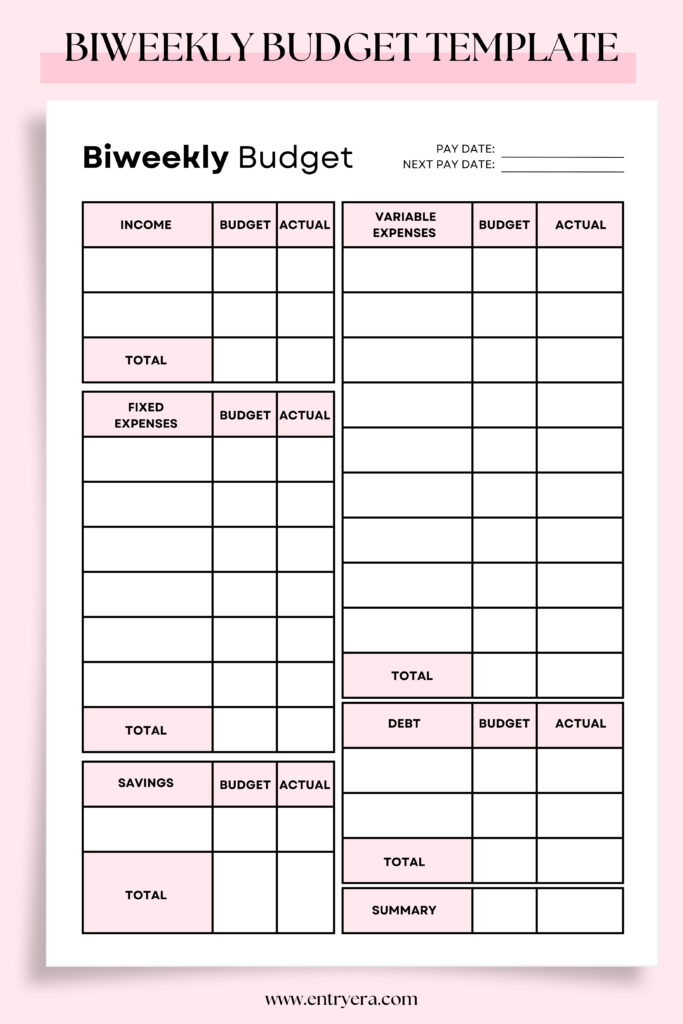Looking for budgeting tips to help you save? Here are 5 strategies that will help you take control of your money and reach your financial goals. These practical techniques have helped countless people manage their finances successfully without sacrificing their lifestyle.
This post may contain affiliate links, which means I’ll receive a commission if you purchase through my links, at no extra cost to you. Please read full disclosure for more information.
Jump to:
- How to track expenses with a budget
- How to budget for long-term goals
- 5 budgeting tips to help you stay on track financially
- Budget planner for beginners
Why is budgeting important?
Budgeting is important because it gives you complete control over your money and helps prevent financial stress. When you budget, you can clearly see where every dollar goes and make informed decisions about your spending. Having a budget also means you’re less likely to overspend or face unexpected financial emergencies.
Does budgeting help you save money?
Yes, budgeting definitely helps you save money by making you aware of unnecessary spending and helping you set aside specific amounts for savings.
When you track your expenses through a budget, you can easily identify areas where you’re spending too much and redirect that money to savings instead. Having a clear savings goal in your budget also makes it much easier to resist impulse purchases.
How to track expenses with a budget
Start by recording every single purchase you make, whether it’s through an app, spreadsheet, or good old pen and paper.
Group your expenses into categories like groceries, transportation, and entertainment to see exactly where your money is going each month. Review your spending weekly to stay on track and make adjustments as needed.
Related article: How Budget Your Biweekly Paycheck

How to budget for long-term goals
To budget for long-term goals, start by clearly defining your long-term goals and calculating exactly how much money you’ll need to achieve them. Break down that total amount into smaller monthly savings targets that you can realistically set aside in your budget.
Make these savings automatic by setting up transfers to a separate account as soon as you get paid.
What is the 50/30/20 budget rule?
The 50/30/20 rule is a straightforward budgeting method where you spend 50% of your after-tax income on needs, 30% on wants, and 20% on savings and debt repayment.
Your needs include essential expenses like rent, utilities, and groceries, while wants cover entertainment and non-essential purchases. This simple framework makes budgeting easier by giving you clear spending boundaries.
5 Budgeting tips to help you stay on track financially
1. Create a realistic budget
The key to successful budgeting is being honest about your income and expenses. Write down your monthly take-home pay and list all your regular expenses, including bills, groceries, and other necessities. Be sure to include some room for entertainment and occasional treats – an overly strict budget is hard to maintain long-term.
2. Track your spending
Knowledge is power when it comes to your finances. Keep tabs on every purchase you make, whether it’s your morning coffee or monthly rent payment. Use a budgeting app, spreadsheet, or notebook – whatever works best for you. After a few weeks, you’ll start to see patterns in your spending and identify areas where you can cut back.
Keep scrolling to get a digital bi-weekly budget planner! If you prefer a physical planner, I highly recommend this one from Amazon.
3. Set specific financial goals
Having clear financial targets gives your budget real purpose. Whether you want to build an emergency fund, save for a down payment, or pay off debt, set specific, measurable goals with deadlines. Break big goals into smaller monthly targets that fit within your budget and celebrate your progress along the way.
4. Prioritize needs over wants
Focus your budget on essential expenses first – like housing, utilities, food, and transportation. Once these needs are covered, you can allocate money for wants like entertainment and shopping. When you need to cut back, start with non-essential expenses rather than compromising on necessities.
5. Review and adjust regularly
Your budget shouldn’t be set in stone. Take time each month to review your spending and see how well you stuck to your plan. If you consistently overspend in certain categories or your income changes, adjust your budget accordingly. Regular check-ins help you stay on track and make your budget more effective over time.
How to make budgeting a habit
Making budgeting a habit is all about consistency and creating a simple routine that works for you. Pick a specific time each week to review your expenses and update your budget – maybe Sunday evening or Monday morning when you’re fresh and focused.
Set reminders on your phone and keep your budgeting tools easily accessible, whether it’s an app or a notebook on your desk.
Budget planner for beginners
Start your budgeting journey by gathering your bank statements and bills to get a clear picture of your monthly income and expenses. Begin with the basics: list your monthly income, subtract your fixed expenses like rent and utilities, then divide the remaining money between savings and flexible spending categories.

Don’t worry about getting it perfect right away – your first budget is just a starting point that you can refine over time.
What are the most common budgeting mistakes?
The biggest budgeting mistakes include underestimating regular expenses and forgetting about irregular bills like annual subscriptions or car maintenance.
Many people also make the mistake of creating an unrealistic budget that’s too restrictive, leading to frustration and giving up entirely.
Another common error is not having a plan for unexpected expenses – always include some buffer in your budget for surprises.
Related article: 10 High Paying Entry Level Jobs That Don’t Require Experience
Start budgeting today to set yourself up for financial success
Taking control of your finances starts with a single step, and today is the perfect time to begin. You don’t need fancy tools or complex spreadsheets to start budgeting – just a willingness to understand where your money goes and where you want it to take you.
By starting your budgeting journey now, you’re making a decision that will benefit you for years to come. The peace of mind that comes from knowing exactly where you stand financially and having a clear path to your goals is worth far more than the small effort it takes to get started.
Remember, successful budgeting isn’t about restricting yourself – it’s about making informed choices that align with what matters most to you.







